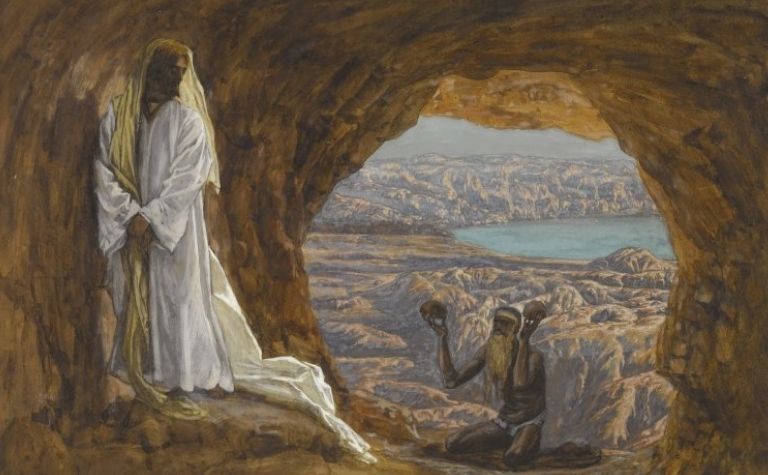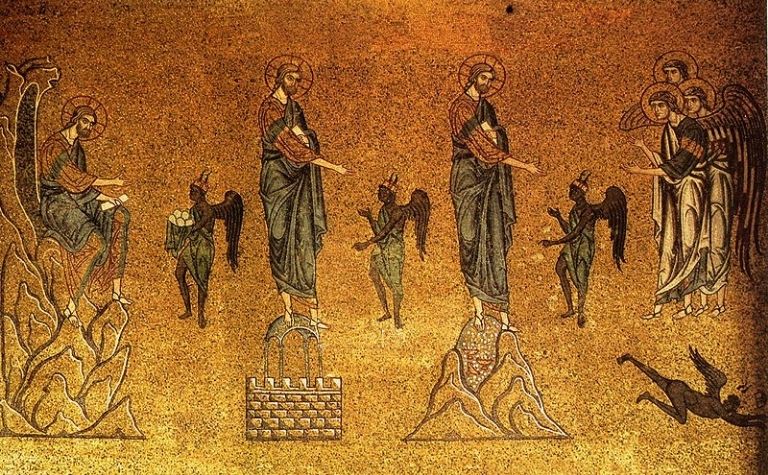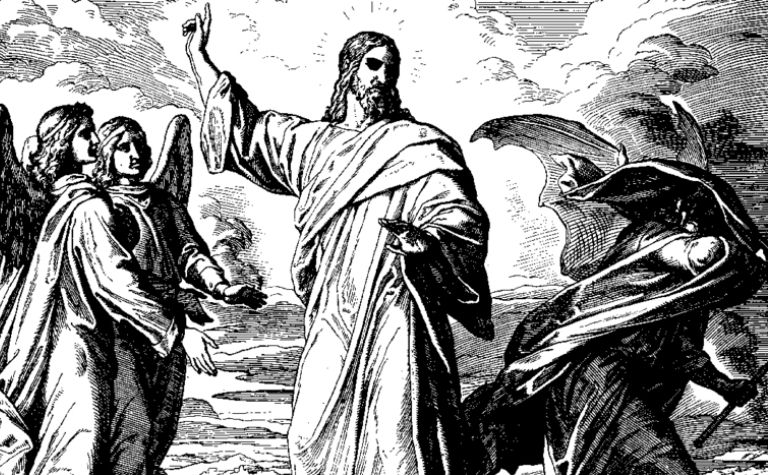After Jesus’ baptism, Matthew, Mark, and Luke report that the Holy Spirit led him into the wilderness in order for the devil to tempt him. The Gospels say that Jesus fasted for 40 days prior to his interaction with the devil. A lot of people who read this story want to know why Jesus fasted.
The Gospels don’t explicitly state why Jesus fasted for 40 days, yet probable reasons include paralleling certain Old Testament stories involving Israel, Moses, and Elijah, devoting more time to prayer, and as an expression of total dependence upon God for resisting the devil’s temptations.
Wouldn’t fasting make Jesus weaker during his temptations? What is significant about the 40-day time period? What Old Testament events and people did Jesus parallel during his time in the wilderness? Keep reading to learn the answers to these questions and others.
Also see How Many Prophecies to Jesus Christ Fulfill? to learn more.

Wouldn’t fasting make Jesus weaker during his temptations?
Matthew 4:2 reads, “And after fasting forty days and forty nights, he was hungry” (ESV). Some translations (e.g. NLT) say that Jesus was “very hungry,” but there is no special intensity indicated in the original Greek. Some translations say “very hungry” or even “famished” (e.g. NRSV) simply because it had been 40 days.
How did the devil tempt Jesus first? Not coincidentally, the devil’s first temptation was daring Jesus to turn stones into bread. “And the tempter came and said to him, ‘If you are the Son of God, command these stones to become loaves of bread'” (ESV). That Matthew calls the devil “the tempter” in this scene (cf. 1 Thess. 3:5) emphasizes that Jesus is undergoing a test.
Did Jesus have the power to perform this miracle? Yes, so why should the only begotten Son of God (John 3:16) be suffering from hunger? God gave Israel manna in the wilderness (Exod. 16:14-16), so why can’t his son turn rocks into food? Having the feeling of a full stomach and acquiring more physical strength could help Jesus resist the temptations that the devil would lob at him next.
Wouldn’t eating food help Jesus overcome the devil’s temptations? Foregoing a 40-day fast or turning stones into bread to eat would give Jesus more physical strength. However, Jesus’ greatest need in this test isn’t energy, but spiritual strength and total dependence upon the Father. Food may have made Jesus’ body stronger, but he would not have been totally relying on the Father for strength.
Also see Did Jesus Have a Last Name? to learn more.

What is significant about 40 days?
In the Bible, 40-day periods of time have great significance. The duration reflects a significant amount of time, although it’s limited, and not permanent. Jesus’ 40-day fast leads Bible readers to consider times in the Old Testament when events occurred for the same period of time, which is likely Matthew’s intention.
- Genesis 7:4, “For in seven days I will send rain on the earth forty days and forty nights, and every living thing that I have made I will blot out from the face of the ground.”
- Numbers 13:25, “At the end of forty days they returned from spying out the land.”
- 1 Samuel 17:16, “For forty days the Philistine came forward and took his stand, morning and evening.”
- Jonah 3:4, “Jonah began to go into the city, going a day’s journey. And he called out, ‘Yet forty days, and Nineveh shall be overthrown!'”
- Acts 1:3, “He presented himself alive to them after his suffering by many proofs, appearing to them during forty days and speaking about the kingdom of God.”
Matthew could have told the story of the devil tempting Jesus in the wilderness without referencing how long Jesus was in the desert. Yet he wants readers to know it was a 40-day period, so they will connect it to Old Testament stories, especially Israel’s 40 years of testing in the wilderness (Exod. 12:41; Acts 7:36).
Also see Was Jesus Christ a Nazarite? to learn more.
Parallel #1: Israel’s 40 years in the desert
Israel spent 430 years wandering in the desert: “At the end of 430 years, on that very day, all the hosts of the Lord went out from the land of Egypt” (Exod. 12:41).
This time period is restated in Acts 7:36 (though it is rounded off): “This man led them out, performing wonders and signs in Egypt and at the Red Sea and in the wilderness for forty years.”
The lesson Matthew wants his readers to learn doesn’t concern an exact parallel of time, as in 40 years versus 40 days. (For exact parallels of time, see the descriptions of Moses and Elijah below.)
The takeaway that Matthew wants his readers to have is that while Israel failed in their wilderness experience, Jesus’ will not fail in his. Jesus is a new, better Israel, according to Matthew.
Parallel #2: Moses’ 40-day period of fasting
Exodus 24:18 reports that Moses was on Mount Sinai for 40 days and 40 nights: “Moses entered the cloud and went up on the mountain. And Moses was on the mountain forty days and forty nights.”
Exodus later records that Moses didn’t eat or drink during this time: “So he was there with the Lord forty days and forty nights. He neither ate bread nor drank water. And he wrote on the tablets the words of the covenant, the Ten Commandments” (34:28).
Deuteronomy 9:9 refers to Moses’ 40-day fast as well: “When I went up the mountain to receive the tablets of stone, the tablets of the covenant that the Lord made with you, I remained on the mountain forty days and forty nights. I neither ate bread nor drank water.”
Also see What Did Jesus Write In the Sand? to learn more.
Parallel #3: Elijah’s 40-day period of fasting
1 Kings 19:8 reports that the prophet Elijah also fasted for 40 days at the same place Moses did: “And he arose and ate and drank, and went in the strength of that food forty days and forty nights to Horeb, the mount of God.”
“Horeb” is another name for “Mount Sinai”; in fact, some translations render the location with that name (e.g. NLT).
Another parallel between Elijah and Jesus’ 40-days periods is that angels ministered to both of them. Angels gave Elijah food prior to his fast (1 Kings 19:5-8) and they ministered to Jesus after his. “Then the devil left him, and behold, angels came and were ministering to him” (Matt. 4:11).

Did Jesus lack food or was his fast intentional?
Matthew tells readers that Jesus fasted for 40 days, but doesn’t provide many details about it. Because he doesn’t include an explicit purpose statement for the fast, some scholars have questioned if Jesus was intentionally partaking in a spiritual discipline or if he merely lacked food in the wilderness environment.
The evidence suggests that Jesus’ fast was intentional for three reasons:
- Moses and Elijah’s fasts were intentional and Jesus’ fast closely parallels them.
- It’s an assumption that the desert was void of food. John the Baptist ate locusts and honey in the same environment: “Now John wore a garment of camel’s hair and a leather belt around his waist, and his food was locusts and wild honey” (Matt. 3:4).
- An intentional fast emphasizes the point Jesus makes in response to the devil’s first temptation: “Man shall not live by bread alone, but by every word that comes from the mouth of God” (Matt. 4:4).
Also see What Color Eyes Did Jesus Have? to learn more.
Related Articles
Joseph and Mary's relationship, including their betrothal and marriage, is one of the most iconic in the Bible. Mary is young, devout, and contemplative. Joseph is humble, obedient, and protective....
The public ministry of Jesus of Nazareth lasted approximately three years. Matthew, Mark, Luke, and John describe Jesus' miraculous birth and a few stories from his early life like his family's...
